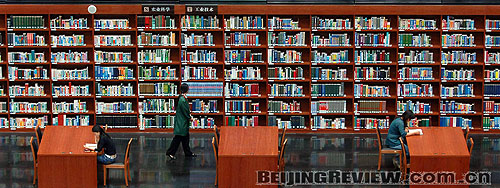|

LITERARY SPACE: A corner of the National Library's new building, which was opened to the ublic on September 9
Beijing Review: The Phase II Project of the NLC and the National Digital Library of China are now in operation. What does this mean for the NLC, a library with a history of 99 years?
Zhan Furui: This is a new step. The expanded library is not only bigger in size

and larger in collection, but also provides readers with a more modern and friendlier reading space.
Rapid development of information science has not only changed people's lifestyles, but has also had a profound impact on the development of libraries all over the world, driving them to reform and innovate. Previously, libraries were brick and mortar facilities, and now they have also moved into cyberspace.
Research shows that after reaching a peak, the number of people visiting libraries started to decline in many countries such as the United States and Japan. This does not mean people read less. It suggests a new trend in people's reading habits, which calls for changes in the services provided by libraries. The digital library is the NLC's effort to meet the challenges of the new era.
Some people say that the NLC is so rarely visited that you can catch sparrows on the doorstep, and the library will turn into a museum. What is your comment on that?
This opinion is one-sided. First, people still need hard copies. Paper will not be replaced very soon. Hard copies are convenient to carry. While reading hard copies, one can stop and think, or make notes on paper. If someday, electronic books can give people the same feeling as hard copies, then it really will be time for hard copies to be put into museums. This is not impossible.
On the other hand, libraries are constantly evolving. Providing traditional services to the general public is only part of the function of a library. As time moves on, the NLC has changed from a book depository into a document and information center, and an education and exchange center. In the eyes of many people, the NLC is a university without walls or degrees.
Now, the NLC not only provides a document and information service, but also hosts various cultural activities, such as reading saloons, education forums, lectures and large history and cultural expositions. It is noteworthy that hosting such cultural and education activities has become a main function of the NLC, which was impossible in the past. These activities can attract readers to the library, and also help to strengthen civic culture and qualities. As people get richer and more educated, the library will become a cultural and education center of the city.
How do you compare the NLC with first-class national libraries around the world?
First, we need to define the functions of a national library. The primary responsibility of a national library is to serve the political power of the state. The U.S. Library of Congress and the National Diet Library of Japan are good examples. To fulfill this responsibility, we set up a special legislative and decision-making service department, to provide effective and professional service for important political meetings and legislative meetings. In addition, we have set up two related special departments, the China Literature Research Center, which is to collect and analyze foreign study on China, and the Legal Document and Literature Research Center, which is to collect important legal documents and literature from across the world.
In addition to serving the government, the NLC has three other responsibilities: That is, to provide services to schools, research institutes and enterprises, guide the development of local libraries in China and serve the general public. In recent years, the NLC has launched some innovations. For instance, to improve information services to enterprises, it has set up an Enterprise Service Center and hosted an annual enterprise information conference. The NLC also provides free training to directors of local libraries in economically underdeveloped regions.
| 